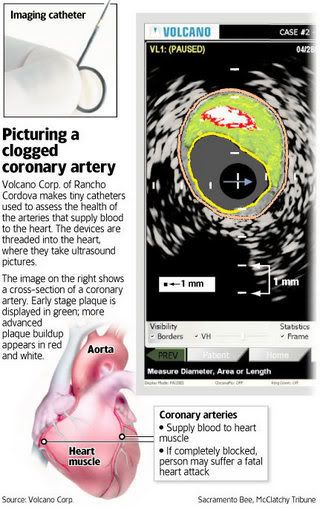Saturday, March 03, 2007 12:14:32 AM
Sounding out heart problems
Rancho Cordova's Volcano Corp. creates buzz among startups
By Jim Downing - Bee Staff Writer
Published 12:00 am PST Sunday, February 25, 2007
Story appeared in BUSINESS section, Page D1
Pity the poor patient whose heart is on display at Volcano Corp. in Rancho Cordova. One of his coronary arteries isn't doing so well.
It's splashed in vivid multicolor on the computer screen, a glob of red and white highlighting what one Volcano engineer calls "a big nasty plaque." Left unchecked, the glob spills open, the artery clogs -- and the patient's gone.
"Volcano was formed to find these plaques before they erupt," said Chief Executive Scott Huennekens.
The graphic shots show off the cardiac diagnostic technology that has fueled Volcano's rise as one of the nation's hottest new public companies: Since its June debut, the company's stock is up 142 percent -- ranking eighth among the 192 IPOs in the past 12 months.
For a tech company, that's the kind of performance often associated with a game-changing innovation.
But while Volcano undoubtedly has been creative, the firm owes its newfound success not so much to technical wizardry as to the clever recasting of a neglected ultrasound technology acquired in mid-2003.
"The digital revolution ... just never caught up with ultrasound until Volcano decided to say, 'Wait a second, the reason it's not growing is not because there's not good demand or good need. The reason it's not growing is because it's so difficult for doctors to use,' " said Thomas Gunderson, a senior analyst with Piper Jaffray and Co., one of four investment banking firms to underwrite Volcano's June stock offering.
Volcano, in fact, is the third in a line of firms to occupy the same building in Rancho Cordova and try to sell ultrasound catheters to the world's cardiologists. EndoSonics Corp., which helped pioneer the devices, operated from 1985 to 2000. It was bought by Dutch-owned Jomed NV, which in turn sold the business in July 2003 to Volcano, then a 25-employee Southern California startup.
In the years that followed, Volcano revamped its catheter system to better integrate it into hospital diagnostic labs and struck a distribution deal with giant GE Healthcare. It hired a veteran marketing team and quadrupled its Rancho Cordova research and development staff. By collaborating with cardiologists at the University of California, Davis, and elsewhere, Volcano has made its equipment an important tool in leading-edge research on heart disease.
The result: Sales have grown from roughly $45 million in 2003 to $103 million in 2006. Volcano and much-larger Boston Scientific each hold about half of the U.S. market for cardiac diagnostic ultrasound catheters.
And there's plenty of room for growth. While most hospital diagnostic labs have ultrasound catheter equipment, most cardiologists haven't made it one of their standard tools.
That's changing quickly, though, particularly because of rising concern about the effectiveness and safety of coronary artery stents -- tiny metal-mesh tubes used to prop open the blood vessels that supply oxygen to the heart.
Cardiologists in the United States perform about 1 million stent procedures a year. Ultrasound catheters like Volcano's produce a three-dimensional view of an artery from the inside, helping the doctor determine where to place a stent and to monitor it thereafter. Cardiologists say this ultrasound picture from inside the vessel complements the two-dimensional image of the arteries produced using the standard X-ray procedure, known as angiography.
Volcano Chief Financial Officer John Dahldorf said U.S. cardiologists now use ultrasound catheters in only about 10 percent of all stent procedures. As ultrasound becomes a more commonly used tool, Volcano stands to gain: Each procedure requires a new $640 disposable catheter. Sales of these disposable catheters accounted for about 60 percent of Volcano's revenues last year.
In addition, Volcano also is developing next-generation applications for ultrasound technology.
The company's creative hub is its "Innovation Center," a 30,000-square-foot, gymnasium-style building that opened 16 months ago just down the street from Volcano's headquarters and factory. The 80 engineers and programmers who work here sit in teams of a dozen or so, their low cubicles circled around whiteboards and messy conference tables. Bicycles appear to be allowed to park anywhere.

FEATURED SMX and FinGo Enter Into Collaboration Mandate to Develop a Joint 'Physical to Digital' Platform Service To Enhance Natural Rubber Industry's Ability to Report on Sustainable and Ethical Supply Chains • Oct 3, 2024 7:00 AM
Basanite, Inc. Appoints Ali Manav as Interim Chief Executive Officer • BASA • Oct 3, 2024 9:15 AM
Integrated Ventures Announces Launch of MedWell Facilities, LLC and Lease Agreement with Giant Fitness Clubs • INTV • Oct 3, 2024 8:45 AM
Beyond the Horizon: Innovative Drug Combinations Offer New Hope for Alzheimer's and More • NVS • Oct 3, 2024 8:45 AM
Transforming Alzheimer's Treatment: Innovative Combinations to Boost Cognition • PFE • Oct 2, 2024 9:00 AM
Unitronix Corp Unveils Cryptocurrency Investment Portfolio Strategy • UTRX • Oct 2, 2024 8:40 AM






